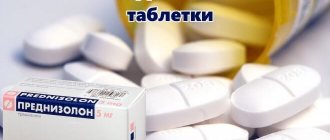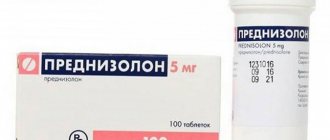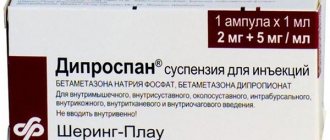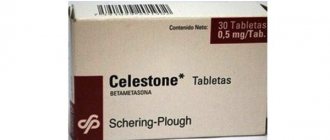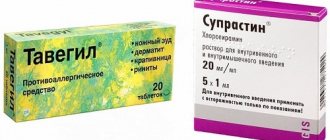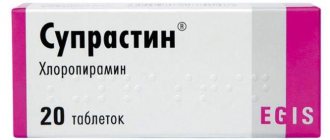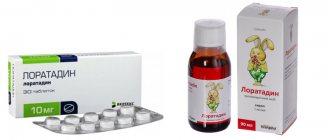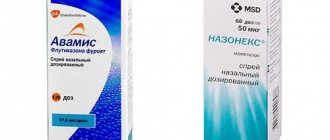Diprospan: instructions for use, price, reviews, analogues
Diprospan is a glucocorticosteroid drug used to relieve pain and inflammation.
The medicine is presented as an injection suspension, which is injected into the tissue of the muscle, joint or periarticular area. We will reveal all the nuances of the drug Diprospan: instructions for use, price, reviews, analogues, and also clarify the mechanism of action of the suspension. The drug is created in the form of a suspension for injections in 1 ml ampoules. The number of ampoules in a package is 1 or 5 pcs. Active ingredients: betamethasone propionate, betamethasone sodium phosphate. The suspension also contains a number of accompanying components. The composition of the suspension provides anti-inflammatory, antiallergic, analgesic, and immunosuppressive effects.
Diprospan is prescribed by a doctor for various diseases, usually as an additional therapy. Indications for use of the drug are as follows:
- diseases of bones, joints, muscles;
- some skin diseases;
- hemoblastosis;
- connective tissue systemic diseases;
- adrenal insufficiency, etc.
The only form of the drug is in the form of a suspension. There is no Diprospan cream or ointment, so injections are used even for skin diseases.
The drug is prohibited in a number of situations:
- for systemic mycoses;
- with joint instability, the presence of infectious inflammation;
- introduction of a suspension between the vertebrae;
- intravenous, subcutaneous administration;
- intolerance to the components of this medicine or other corticosteroids.
You might be interested in knowing how to treat infectious arthritis? This is written in detail in our article.
The presence and intensity of side effects depend on the duration of therapy and dosage of the drug. Blockade of Diprospan can cause the following reactions from various systems:
- cardiovascular: increased blood pressure, heart failure (in those who are predisposed to this disease);
- musculoskeletal: reduction of muscle mass, muscle weakness, osteoporosis, tendon rupture, etc.;
- skin: dermal atrophy and thinning, skin irritation, stretch marks, steroid acne, etc.;
- Gastrointestinal tract: pancreatitis, flatulence, hiccups, development of erosions and ulcers in different parts of the gastrointestinal tract;
- nervous system: dizziness, convulsions, excessive intracranial pressure, migraine, depression, sudden mood swings;
- endocrine system: disruptions in the menstrual cycle, adrenal insufficiency, delayed sexual development, growth in pediatric patients, diabetes mellitus;
- metabolism: lipomatosis, weight gain, negative nitrogen balance, hypernatremia, etc.;
- organ of vision: glaucoma, excessive eye pressure, cataracts, exophthalmos. How else can Diprospan be dangerous for vision? If the drug gets into the head area, blindness is possible.
Redness, aseptic abscess, pigmentation, and skin atrophy may be observed in the injection area. A temporary rush of blood to the face, neurogenic arthropathy, is possible. Obviously, the drug is prescribed only when absolutely necessary.
The drug is administered under conditions of absolute asepsis. The initial dosage is usually 1-2 ml. However, the dose of the medicine, duration of therapy, and method of administration are determined solely by the doctor. When administered intramuscularly, the drug must penetrate deep into large muscles without getting into other tissues in order to avoid their atrophy. The dosage for intramuscular use also depends on the specifics of the disease:
- dermatology: usually 1 ml per injection is enough;
- diseases of the respiratory system: 1-2 ml of Diprospan. How long does it take for this medicine to start working? For asthma, allergic rhinitis, bronchitis, hay fever, the suspension will alleviate the patient’s condition within a few hours;
- bursitis: initial dose – 1-2 ml. Further, the injections can be extended if the situation requires it;
- acute conditions requiring prompt intervention: 2 ml of the drug.
When the drug is administered locally, another analgesic is sometimes required. This may be lidocaine or procaine hydrochloride (1-2%), but they should not contain methylparaben, phenol, propylparaben. Mixing of drugs should take place in a syringe: first, the required amount of Diprospan is taken, then the anesthetic. After this, the mixture is quickly shaken. When administered locally, the specifics of the disease should also be taken into account:
- acute bursitis: 1-2 ml of the drug is injected into the synoveal bursa. How often can Diprospan be injected? For chronic inflammation, the drug is used in a course followed by a dose reduction. The duration and dose of the drug is determined by the doctor;
- osteoarthritis, rheumatoid arthritis: 0.25-0.5 ml in small joints, 0.5-1 ml in medium ones, 1-2 ml in large ones;
- dermatological diseases: 0.2 ml/sq.cm intradermally into the lesion. The total amount of medication should not be more than 1 ml for 7 days.
How to cure osteoarthritis of the knee joint? Find out now!
The course of Diprospan is canceled sequentially, reducing the dosage from time to time. The patient is monitored for a year after discontinuation of the course.
These injections can be replaced with other drugs. The following suspensions are closest in action to Diprospan:
Remember that Diprospan and all its analogues have many side effects. They should not be used uncontrollably so as not to harm your own health.
Alcohol itself is harmful to the human body, and if ethyl alcohol and betamethasone enter the bloodstream at the same time, the side effects may increase. Drinking alcohol during a course of Diprospan injections is especially dangerous for people with chronic or acute diseases of various systems. Alcohol ingested together with betamethasone is fraught with the following health consequences:
- hormonal imbalance;
- hyperglycemia;
- coma;
- heart failure;
- increased intraocular pressure;
- disruptions in the gastrointestinal tract. Existing erosions and ulcers may bleed; severe allergic reactions.
Obviously, alcohol should not be taken after Diprospan injection. Drinking alcoholic beverages is allowed in small quantities a few days after the injection, when the active substance is removed from the body. Watch the doctor’s review of the drug Diprospan in the following video:
So, Diprospan is a hormonal drug that is effective for inflammatory diseases of the joints and other ailments. This medicine is considered vital, and its price is low. However, uncontrolled use of Diprospan is unacceptable, because the drug brings a number of side effects. You can buy ampoules with suspension only with a doctor's prescription.
- Painkillers
- Principle of operation
- Use of analgesics
- Nonsteroidal anti-inflammatory drugs (NSAIDs)
- Principle of operation
- Use of NSAIDs
- Disease-modifying antirheumatic drugs (DMARDs)
- Use of DMARDs
- Biological agents
- Principle of operation
- Use of biological agents
- Corticosteroids
- Operating principle
- Use of corticosteroids
- What is the best way to treat arthritis?
- Conclusion
There are many ways to treat arthritis. One of the main methods of traditional medicine is drug therapy, which is aimed at eliminating inflammation, alleviating symptoms of the disease and restoring joint function. What medications are used for this? Let's talk in more detail about the pros, cons and features of each group of medications.
Analgesics are drugs that relieve pain. There are several types of analgesics: acetaminophen-based (available from pharmacies without a prescription), opioid analgesics (available with a doctor's prescription), and combination medications that contain both acetaminophen and an opioid.
Acetaminophen-based medications (such as Tylenol) are suitable for relieving moderate pain and discomfort. Opioid and mixed analgesics - Oxycodone, Methadone, Tramadol, Morphine, Oxycontrine, Vicodin, etc. - are prescribed for severe pain.
Our readers successfully use SustaLife to treat joints. Seeing how popular this product is, we decided to bring it to your attention. Read more here...
Opioids (synthetic drugs) bind to receptors in cells of the brain, spinal cord and gastrointestinal tract and thus “turn off” pain centers and block the transmission of pain impulses. Opioid pain relievers are more effective than acetaminophen in many cases, but they are more likely to cause side effects. These medications are taken either on demand or on a schedule at regular intervals.
Opioids used to be used primarily to relieve acute pain (such as after surgery or a serious injury), but they are now also prescribed to relieve chronic pain, including arthritis. These drugs are a suitable option for patients suffering primarily from severe pain rather than inflammation.
Non-narcotic acetaminophen-based analgesics work in a different way: they inhibit the synthesis of certain enzymes involved in the formation of prostaglandins, which are the cause of pain. More details about prostaglandins a little further.
The advantages of analgesics over non-steroidal anti-inflammatory drugs (specifically in terms of pain relief) are higher efficiency and the absence of side effects from the gastrointestinal tract. A significant disadvantage of painkillers is that they do not relieve inflammation, and with prolonged use they can become addictive.
If you are recommended to treat arthritis with analgesics, know:
Nonsteroidal anti-inflammatory drugs (NSAIDs) are widely used to treat arthritis by reducing inflammation and pain.
While analgesics directly combat pain, NSAIDs reduce both of the most unpleasant symptoms of the disease: pain and inflammation. This group of medications includes Motrin, Advil, Ecotrin, Celebrex, Clinoril, Voltaren, Naprosyn, etc.
Non-steroidal anti-inflammatory drugs block the work of hormone-like substances - prostaglandins. These substances perform an important function - they protect the gastric mucosa from their own digestive fluids. At the same time, it is prostaglandins that are involved in pain and inflammation. NSAIDs block the work of prostaglandins. Pain and inflammation decrease, but the gastric mucosa becomes more vulnerable to the formation of ulcers and bleeding.
Nonsteroidal anti-inflammatory drugs show excellent results in the treatment of arthritis, but the use of these medications has its own nuances:
- These medications are not recommended for patients with stomach ulcers, a history of stomach bleeding, liver disease, kidney disease, heart disease, asthma, or hypertension.
- Taking any NSAIDs carries a risk of blood clots, heart attack or stroke. The risks are higher in patients suffering from diseases of the cardiovascular system.
- NSAIDs should not be used in patients who have undergone coronary artery bypass surgery.
- The use of NSAIDs may cause sudden bleeding in the gastrointestinal tract. In this regard, you should regularly undergo tests (blood, liver enzymes) to monitor the effect of the medication.

Different DMARDs have different principles of action, but the same positive effect is achieved in all cases - the progression of the disease either stops or slows down. The use of DMARDs helps prevent damage to joints and internal organs.
This group includes drugs: Plaquenil, Arava, Neoral, Imuran, Cytoxan.
Disease-modifying antirheumatic drugs are most often prescribed to patients who are at high risk of irreversible joint destruction. The use of these medications is indicated for rheumatoid, psoriatic and juvenile idiopathic arthritis.
The main advantage of DMARDs is that even with long-term use they do not cause addiction or serious side effects. A significant disadvantage of this group of medications is their slow action. That is why, in the treatment of arthritis, DMARDs are often used in combination with other drugs that have a faster effect, for example, NSAIDs, corticosteroids, etc.
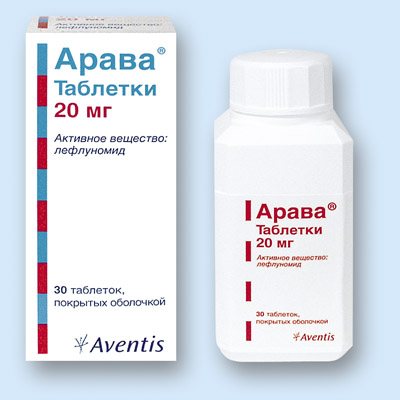
Biological agents (biological response modifiers) are medicines obtained by genetic engineering from living organisms (viruses, genes or proteins).
Popular biological agents prescribed for arthritis: Actemra, Orence, Rituximab, Simponi, etc.
The purpose of these medications is to stimulate the body's natural response to infection or disease. The target of biological agents entering the body are proteins, cells and intercellular communication pathways responsible for the symptoms and destructive effects of rheumatoid and other types of arthritis. These drugs work in one of the following ways:
- block extracellular protein (tumor necrosis factor), which is produced by white blood cells and causes inflammation of the joints;
- block white blood cells (B-lymphocytes), which produce antibodies and are present in large numbers in the body of patients with arthritis;
- block proteins involved in the development of inflammatory processes in joints;
- suppress the activation of white blood cells (T-lymphocytes), thereby interrupting the chain reaction leading to the development of inflammation.
The use of biological response modifiers, like any other medication, entails certain risks:
Corticosteroids are medications that mimic the effects of the hormone cortisol, which is naturally produced in the body by the adrenal glands. Cortisol affects various systems of the body, including the immune system.
This group includes Celeston, Prednisolone, Diprospan, Metipred, etc.
Corticosteroids lower prostaglandin levels and disrupt the interaction between certain white blood cells (T and B lymphocytes) involved in the immune response. Due to this, corticosteroids control inflammatory processes. Medicines are available in various forms: tablets, mixtures, sprays, drops, injections, ointments, etc. They act quickly and are often prescribed to patients suffering from arthritis and similar diseases. Compared to NSAIDs, corticosteroids have a more powerful anti-inflammatory effect, and these medications are simply irreplaceable for autoimmune diseases, when it is necessary to suppress the body's immune response. However, due to this action, the body becomes more vulnerable to infections - this is the main drawback of these drugs.
Medicines in this category can be used either alone or in combination with other medicines. Remember:
- You should not change the dose of corticosteroids on your own, otherwise this may reduce the natural hormone cortisol to dangerous levels.
- The dosage reduction should be gradual to allow the adrenal glands to adapt to the changes.
- Long-term use of corticosteroids in low doses is often prescribed for rheumatoid arthritis, but debate among doctors about the benefits and side effects of such treatment continues to this day.
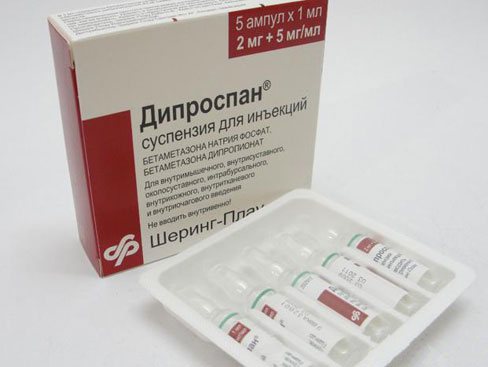
Only a doctor can prescribe the appropriate drug, correctly calculate the dosage and draw up a medication regimen.
Our readers successfully use SustaLife to treat joints. Seeing how popular this product is, we decided to bring it to your attention. Read more here...
A huge variety of medications to relieve symptoms and treat arthritis allows you to choose the optimal treatment regimen for each patient, taking into account all the features of a particular situation. If one method is not suitable, you can try another or combine drugs from different groups. The most important conditions for successful treatment of an illness are reliable information about the state of the body (features of the functioning of certain organs, the presence or absence of diseases), a clearly drawn up treatment regimen and the correct dosage of medications.
- Folk remedies for arthritis
- Effective treatment of various types of joint polyarthritis
- Causes and types of knee arthritis, symptoms and treatment
- A selection of the best methods for treating rheumatoid arthritis with folk remedies
Arthritis of the finger joints: symptoms and proper treatment
Patient reviews
Evgenia, 32 years old, Novorossiysk
My husband took prednisolone 2 months ago. Red spots appeared on his body that itched. Various antihistamines did not help; my husband took Suprastin and Diazolin for 14 days. They couldn’t find out the cause of the allergy; the doctor advised me to try hormonal ointment. Prednisolone was purchased by prescription. The medicine helped almost immediately. The itching decreased and my husband was able to sleep normally. Without consulting with the attending physician, the husband also purchased pills. I drank them daily, morning and evening.
A few days later, the condition worsened, the husband began to complain of stomach pain and bouts of nausea. There were problems with sleep. The therapist advised me to stop taking the pills and treat myself only with ointment. The side effects went away on their own after a few days.
Vladimir, 61 years old, St. Petersburg
I haven’t been able to get rid of idiopathic eczema for 6 years. The disease is chronic and worsens several times a year. Papules appear on the skin, their formation is accompanied by severe burning and itching. After a few days, fluid accumulates inside the papules; if measures are not taken in time, they become inflamed and fester.
Acute inflammation during an allergic reaction is relieved with Dexamethasone. I inject the solution intramuscularly - injections help faster than tablets. I give injections once a day for 5-6 days. In order to reduce the risk of developing digestive tract disorders, I try to give up foods of plant origin during treatment. The medicine is extremely effective, but has several disadvantages.
Withdrawal syndrome occurs with prolonged use. Treatment cannot be stopped immediately - the dose is reduced gradually over several days. Sometimes there is pain in the lumbar region and slight swelling. I also consider the price of the medicine to be a definite plus.
Pharmacological properties, forms, indications, limitations
The use of Dexamethasone and Diprospan is very wide. These drugs are highly effective because they are long-acting glucocorticosteroids (GCS). Long-term use of these medications is not advisable, as they greatly suppress adrenal function. Doctors try to prescribe medications in short courses or once for first aid.
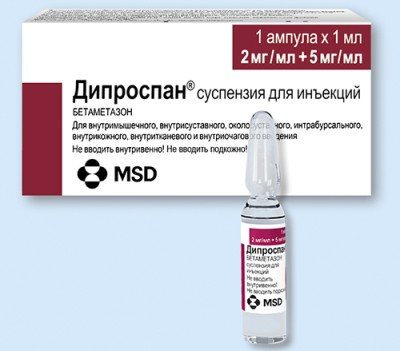
Glucocorticosteroid hormones have anti-inflammatory, antiallergic, and immunosuppressive effects. From the side of the effect on the adrenal cortex, Diprospan will be stronger. Dexamethasone is slightly weaker in terms of its effect on the adrenal glands. Diprospan has less impact on carbohydrate metabolism, so it can be used in short courses in patients with diabetes.
Side effects
Like any glucocorticoid-based medicine, Diprospan has side effects:
- the appearance of anxiety, depression, sleep disorders, seizures;
- hormonal imbalance leading to weight gain;
- exacerbation of gastritis or stomach ulcers;
- growth inhibition when used in a child;
- increased susceptibility to infectious diseases.
If during therapy with Diprospan the recommended dose was exceeded, vomiting, increased excitability, and insomnia may occur. You should not self-prescribe this medicine because it is toxic if used incorrectly.
Terms of use
Diprospan is not used for allergies to Betamethasone or common fungal infections. The drug is not prescribed intravenously or subcutaneously. Intra-articular administration is prohibited if the joint is unstable, or if there is an infectious lesion of the articular joint. The medicine is not administered into infected surfaces, as well as into intervertebral spaces.
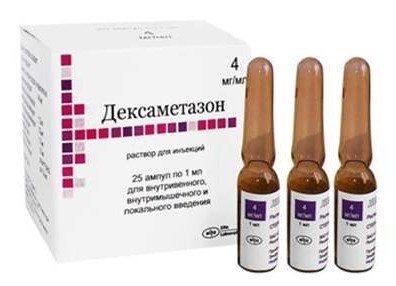
Dexamethasone is not prescribed for diabetes, allergies to the components of the drug, bone fractures, joint deformities, after vaccination, osteoporosis, after a heart attack. Both medications are used in short courses with gradual withdrawal. Rapid discontinuation of medications can lead to adrenal insufficiency.
For joints, it is better to take Betamethasone. The medicine has less stress on the pituitary gland, causes less osteoporosis, relieves inflammation well, causes less potassium loss, and does not stimulate appetite. It is injected into the joint cavity with 1-2 ml depending on the size. Intramuscular administration is acceptable in emergency situations. The medicine must be injected deep into a large muscle.
An intramuscular injection is prescribed for the treatment of:
- acute conditions (shock);
- pulmonary diseases (bronchial asthma, allergic bronchitis);
- acute, chronic bursitis.
Diprospan is not prescribed simultaneously with Dexamethasone. The drugs can be replaced with each other, as they have similar effects. When taken together, unwanted effects may occur much more quickly than with monotherapy. Dexamethasone is most often prescribed intravenously and intramuscularly. Dosages are selected for each disease.
Dexamethasone or Hydrocortisone – which is better?
Lyudmila Aksakova
I have rheumatoid arthritis of the knee joint, I took these pills for a month and my periods suddenly stopped, plus I feel sick all the time, should I stop the treatment? Please advise what is best to do!
Prednisolone is an analogue of Dexamethasone in tablets and injections. It is a glucocorticosteroid with an average duration of action. It has anti-inflammatory, anti-allergic and anti-exudative effects.
https://www.youtube.com/watch?v=23cTNC65N5U
Some buyers are interested in whether Prednisolone can be replaced with Dexamethasone. The first drug is 4 times weaker and less toxic. You can replace it with your doctor, if there are no contraindications, the correct dosage and course of treatment are selected. The main situations for choosing an analogue are pregnancy, the need for long-term therapy, and contraindications for use. For diabetes mellitus, an analogue is also preferable.
Diprospan is an analogue of Dexamethasone in injections for joints. Belongs to the group of glucocorticosteroids based on betamethasone. It is a combination of fast-acting and depot forms. Used for inflammatory and degenerative joint diseases.
Dexamethasone analogue 12 units is used intramuscularly, intraarticularly, intradermally, intralesional. Not intended for subcutaneous and intravenous administration. The frequency of use is determined by the indications and condition of the patient: it can be administered 1-2 times a month, six months, a year.
Hydrocortisone is an analogue in ampoules, also in the form of regular and eye ointments, mainly domestically produced. Belongs to the group of short-acting glucocorticosteroids (8–12 hours), ampoules are administered intramuscularly, intraarticularly or used for inhalation. Dispensed with a doctor's prescription.
Indications, contraindications and adverse reactions are similar. They belong to the same price group. Which is better is individual and determined by a specialist based on medical history. When choosing a Dexamethasone substitute, you should consult with your doctor. Analogs are available with a doctor's prescription and have a number of restrictions and adverse reactions.
Eleonora Pshennikova
How do I understand prednisolone is a hormonal drug? In case of acute hepatitis, is it possible to replace it with something equally effective, but at the same time not giving such severe side effects as are described in the instructions for this solution?
SERGY DZHUMAILO
hello, all hormonal remedies are deception - relief is only for a few hours, but what next? you know the addiction, the brain turns off, the side effects begin, we run to the doctors and they put us on Dinroslan and everything goes in a circle, no improvement - it’s a shame, annoying, but okay, you need to be attentive to everything, don’t sin, but keep the commandments of God and you will be healthy
Compound similarities
The similarity in the compositions of these drugs is that their active components are glucocorticosteroids. They have pronounced hormonal and anti-inflammatory activity, affecting the processes of synthesis and metabolism of hormones of the adrenal cortex.
Dexamethasone contains dexamethasone sodium phosphate. Diprospan contains betamethasone. Both medicinal components penetrate into the cell and interact with steroid receptors. Due to this, the body’s adaptation to allergens, toxins and other unfavorable environmental factors improves. Glucocorticosteroids affect the metabolism of proteins, carbohydrates, potassium and sodium.
The similarities in the compositions of these drugs determine some of the features of their use. They are limited in cases of severe metabolic disorders, especially diabetes and adrenal insufficiency. In patients with diabetes mellitus, a decrease in the intensity of the effects of glucose-lowering drugs is found.
The use of these drugs when an infection develops in the body always requires the parallel use of antibiotics. If antibiotics are ignored, the patient's health may worsen.
The use of glucocorticosteroids together with thiazide diuretics contributes to the development of severe potassium deficiency in the blood and cardiac dysfunction.
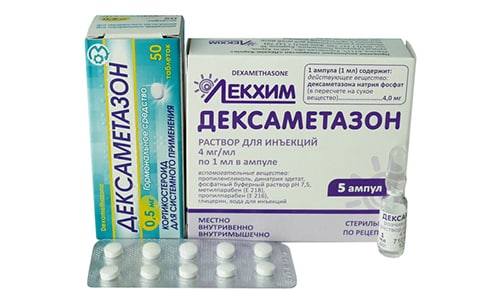
The use of Dexamethasone improves the body's adaptation to allergens, toxins and other adverse environmental factors.
Glucocorticosteroid drugs - Diprospan, Dexamethasone and their analogues change or mask the course of some infectious pathologies. Viral diseases - chickenpox, measles, etc. are more severe.
With cirrhosis of the liver or insufficient function, an increase in the effect of the drugs is observed. This is taken into account when choosing a treatment regimen for patients with liver and kidney disorders. Glucocorticosteroid drugs aggravate the course of fungal pathologies.
During therapy, avoid drinking any alcoholic beverages. At the same time, driving vehicles is contraindicated, because glucocorticosteroids negatively affect attention and reaction speed.
The simultaneous use of these drugs is prohibited. Because active components belong to the same group; their combined use causes the development of dangerous side effects: a decrease in blood pressure and heart rate. Patients are more likely to develop anaphylactic shock.
Indications for use
Diprospan is used in the treatment of various diseases. It can be part of medicinal blockades for the relief of acute pain. This drug is prescribed as part of complex therapy for the following pathologies:
- attacks of radiculitis, bursitis, lumbago;
- osteoporosis, fasciitis, rheumatoid arthritis;
- allergic rhinitis, dermatitis;
- bronchial asthma;
- photodermatitis, lichen planus, atopic and contact dermatitis;
- eczema, psoriasis, cystic acne;
- periarteritis nodosa, lupus erythematosus.
For scaly lichen, external medications are more often used. But if the patient’s condition worsens, inflammation occurs, or fluid appears on the plaques, diprospan for psoriasis in the form of injections is indicated. It produces a powerful anti-inflammatory effect that is prolonged. Betamethasone in Diprospan is easily absorbed, so the medicine begins to work quickly. It has a positive effect on metabolic processes. Mild forms of psoriasis are not treated with diprospan, because it has an impressive list of contraindications.
Read here how to treat lichen planus in children, how to get rid of white spots on the skin after psoriasis, what causes pink and asbestos lichen in humans.
Psychosomatic causes of rashes on the body, what happens to a person who is susceptible to the disease, see our material - psychosomatic psoriasis.
Where does psoriasis come from and how can it be treated, read here - causes of psoriasis.
Differences between Diprospan and Dexamethasone
Dexamethasone interacts with cytoplasmic receptors and prevents the further development of acute allergic manifestations. The drug reduces capillary permeability, stabilizes cell membranes, and inhibits the release of cytokines.
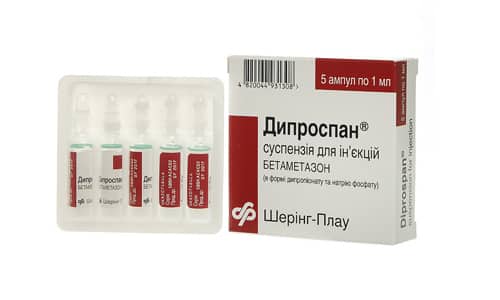
Diprospan is indicated if there are: rheumatological diseases, incl. arthritis, bursitis, allergic diseases, bronchial asthma.
The differences between these drugs are in the indications for use. Dexamethasone is indicated in the following cases:
- systemic diseases;
- pathological conditions of the joints;
- psoriasis and other skin pathologies;
- allergic conditions due to insect bites;
- cerebral edema;
- eye diseases;
- adrenal insufficiency;
- autoimmune diseases of the liver and kidneys;
- anemia, leukemia and other pathologies of the hematopoietic system;
- pulmonary diseases, incl. pulmonary tuberculosis;
- tuberculous brain damage;
- lungs' cancer;
- various diseases of the digestive tract.
In addition, Dexamethasone is indicated for the emergency treatment of shock. It is used for the differential diagnosis of adrenal diseases.
Diprospan is indicated in the following cases:
- rheumatological diseases, incl. arthritis, bursitis;
- allergic diseases;
- bronchial asthma;
- skin diseases - urticaria, lichen, pemphigus, psoriasis;
- lupus erythematosus;
- scleroderma;
- various pathologies of blood and lymph;
- adrenal insufficiency.
Characteristics of Prednisolone
Due to its anti-inflammatory, anti-shock and anti-allergic effects, a hormonal drug can be used in therapy:
- rheumatoid arthritis;
- hepatitis A;
- lung diseases, including alveolitis;
- adrenal insufficiency;
- allergic reaction;
- autoimmune or ophthalmological diseases;
- inflammation of muscles, ligaments;
- multiple sclerosis;
- blood cancer;
- cerebral edema.
The drug is recommended for use in severe joint infections that provoke the development of Still's syndrome and arthritis. The medication has several dosage forms, including injection solution and tablets.
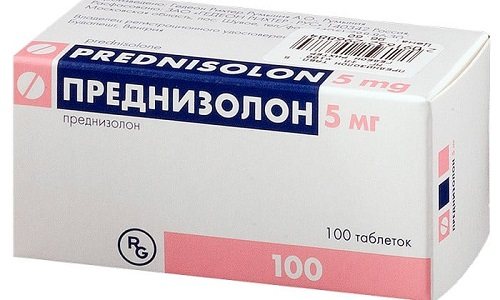
The drug is not recommended for use in patients who have:
- severe impairment of the kidneys or liver;
- diabetes;
- peptic ulcer of the digestive tract, colitis;
- complications of HIV.
The drug is contraindicated during the recovery period after herpes, chickenpox, and heart attack.
Contraindications
Dexamethasone is contraindicated in the following cases:
- hypersensitivity to the drug;
- systemic fungal diseases;
- amoebiasis;
- infectious inflammatory diseases of the joints;
- active forms of tuberculosis infection;
- introduction of preventive antiviral vaccination (before and after vaccination);
- acute purulent infection of the eye.
Diprospan is contraindicated in the following cases:
- individual sensitivity to the active component;
- exacerbation of gastric or duodenal ulcers;
- osteoporosis (a disorder of the structure of bone tissue leading to pathological fractures);
- adrenal insufficiency syndrome;
- tuberculosis of any organ in the active phase;
- varicose veins or thrombophlebitis;
- any infectious processes;
- psychoses;
- diverticulitis;
- undergone surgery to perform intestinal anastomosis.
Which drug is better
When choosing which is better, Dexamethasone or Prednisolone, you must follow your doctor's recommendations . This is due to the fact that each of these drugs has a different dosage of the main substance. It is known that various drugs, which include natural hormones, act on the body in different ways. For example, hydrocortisone is 4 times weaker, and metypred or triamcinolone is 20% stronger than Prednisolone. At the same time, Prednisolone is 7 times weaker than Dexamethasone and 10 times weaker than Betamethasone.
When deciding on one or another hormonal drug, the doctor will definitely take into account the degree of the disease and the general physical condition of the patient. Of course, for each specific case, the doctor will choose the appropriate medicine, but will never recommend taking Prednisolone together with Dexamethasone.
How to take Diprospan and Dexamethasone?
The drugs are intended for intravenous, intramuscular, intraarticular, periarticular, retrobulbar administration. The method of administration and dosage is chosen by the doctor, taking into account each individual case of the disease and its severity.
To prepare a solution for intravenous drip administration, an isotonic solution of sodium chloride or a 5% dextrose solution is used as a basis. A concentrated dose of medication can be administered for a maximum of 3 days. Subsequently, each dose of the drug is diluted with an isotonic solution of sodium chloride.
In emergency cases, the injection is given intravenously, or the drug is administered slowly, in a stream or using the drip method. The maximum single dose of Diprospan or Dexamethasone is 20 mg, daily dose is 80 mg. Maintenance dosage – up to 9 mg of drugs per day.
Release forms and price
Prednisolone can be found at the following prices:
- Solution for injection 2.5%, 50 ml, 1 bottle – 570 RUR;
- Solution for injection, ampoules 30 mg/ml, 3 pcs. – 35 – 45 rub;
- Ointment 0.5%, 10 g – 20 r;
- Ointment 0.5%, 15 g – 40 rub.
Prices for Dexamethasone:
- Tablets 0.5 mg:
- 10 pieces. – 30 – 45 rub;
- 56 pcs. – 50 rub;
- Eye drops 0.1%:
- 5 ml – 200 – 335 rub;
- 10 ml – 100 rub;
- Solution for injection, ampoules 4 mg/ml, 25 pcs. – 100 – 200 rub;
- Solution for injection 0.4%, bottle 50 ml, 1 pc. – 515 rub.
The cost of drugs varies significantly depending on the manufacturer.
Side effects of Diprospan and Dexamethasone
Dexamethasone causes the following side effects:
- sodium and fluid retention, manifested in edema, loss of potassium and calcium, hypokalemic alkalosis;
- erosive and ulcerative lesions of the mucous membrane of the digestive tract;
- pancreatitis;
- atony of the digestive tract;
- dyspeptic symptoms, manifested by nausea and vomiting, bloating, hiccups, constipation;
- muscle weakness;
- sudden disturbances in the functioning of the cardiovascular system, manifested by bradycardia (decreased heart rate) or tachycardia (increased heart rate), increased or decreased blood pressure;
- disorders of the central and autonomic nervous system (dizziness, pain in the head, mood swings, pain along the nerves);
- skin disorders (thinning, increased tendency to abrasions and wounds, the appearance of a large number of acne, rashes, stretch marks, changes in some areas of pigmentation);
- sensation of pain and burning at the injection site;
- angioedema;
- increased intraocular pressure;
- adrenal insufficiency;
- decreased tolerance to carbohydrates, which in turn provokes the development of diabetes;
- development of allergic reactions in the form of rash and skin itching (in rare cases, Quincke's edema, angioedema and even anaphylactoid reaction are diagnosed);
- false negative results during allergy tests;
- absence of the menstrual cycle in women.
In rare cases, Dexamethasone causes transient blindness and deafness, cataracts, glaucoma, and withdrawal symptoms after long-term use in high doses.
Side effects of Diprospan:
- sleep disturbance;
- severe psychomotor agitation;
- increasing anxiety;
- neurosis;
- sharp increase in appetite;
- depression;
- changes in the composition and structure of bone tissue;
- weight gain;
- addition of a secondary bacterial infection.
Doctors' opinion
Valentin Alekseevich, neurologist
Both medications allow you to cope with pain due to pathologies of the spine or joints. Preference is often given to Dexamethasone, but it provokes a deterioration in the condition of patients with pathologies of the cardiovascular system and the development of osteoporosis.
Olga Maksimovna, dermatologist
Prednisolone effectively copes with itching and inflammation, both forms of an allergic reaction. The drug can be used to treat dermatitis or eczema. When the dosage is correctly selected, the drug is well tolerated by patients and allows for rapid improvement.
